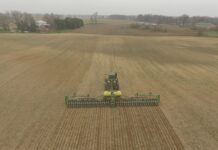SALEM, Ohio – For nearly two years, Howard Parrish said he did not swap his granddaughter’s grand champion hog with another animal before it went to the slaughterhouse in September 2004. On March 16, a Franklin County judge agreed.
Common Pleas Court Judge Richard S. Sheward overturned the Ohio Department of Agriculture’s penalty against Parrish, saying the department did not have enough evidence to impose the punishment. The penalty, which was handed down Sept. 1, 2005, included barring Parrish from handling, selling, offering for sale and judging at all Ohio livestock exhibitions in 2006.
“We’re baffled by this judge’s decision and we’re planning to appeal,” said LeeAnne Mizer, department spokesperson.
Parrish declined to comment April 5, saying his attorney advised against it.
Violation. The department claimed Parrish violated several Ohio laws when he instructed his granddaughter, Caprianna Parrish, and her father, Frank Parrish, to take the hog home after the 2004 Williams County Fair.
Specifically, the department said he violated the law requiring at least the grand and reserve champion animals at partial terminal shows to be slaughtered and the law requiring all livestock to go directly from the fairground to the slaughterhouse. The department also said Parrish refused to cooperate with its investigation.
The problem began as the result of a long-standing, but illegal, practice at the Williams County Fair. Several years ago, the county fair board adopted a rule allowing exhibitors to take their animals home before transporting them to the slaughterhouse after the fair. The fair board – which Parrish was a member of for 20 years before resigning last summer – did not have the authority to make the amendment to the state’s law, but nevertheless it was a common local practice.
Court documents say the rule was changed to ease overcrowding after the fair at the county’s only slaughterhouse. The court was unsure why another slaughterhouse, even one outside the county, could not be used. However, it acknowledged the fair board’s reasoning for changing the rule.
In his ruling, the judge said it would be unfair to punish any Williams County exhibitor for failing to abide by the state laws regarding livestock transportation when the county fair board set rules to the contrary.
Missing hog. When the hog didn’t show up at the slaughterhouse, investigators from the state ag department went to the Parrish farm Sept. 21, 2004, to find out why. Howard Parrish admitted the hog was still on the farm and told investigators the owner of the slaughterhouse instructed him not to bring it until later.
According to documents from the hearing officer who reviewed the case in 2005, there is disagreement over whether or not the owner of the slaughterhouse gave Parrish those instructions.
The department said this exchange obstructed its investigation, but neither the hearing officer or the court found evidence Parrish failed to cooperate.
Either way, the judge found Parrish was abiding by county rules – however incorrect – at the time of the exchange, so his statements to investigators were irrelevant.
After speaking with investigators, Parrish delivered a hog with the correct ear tag to the slaughterhouse, but ear notches showed it wasn’t the same hog Caprianna exhibited at the fair. The ear notches identified it as a hog shown at the fair by another exhibitor.
Break in. In determining what could’ve happened to the grand champion hog, the Parrish family claimed shortly after the fair someone broke into a pen of hogs at the farm and let all the animals out, potentially switching the grand champion animal with another one.
A report from the Williams County Sheriff’s Office shows this happened Sept. 24, but Parrish said it happened Sept. 20, while the grand champion was still on the farm.
Also, court documents state the slaughterhouse was not secure, with unlocked gates that could have allowed someone to swap the animals between the time Parrish delivered the hog Sept. 21 and the time it was slaughtered Sept. 22.
The true grand champion hog has never been located.
In his ruling, the judge said if Parrish truly had no idea what happened to the hog – due to a break-in at the farm or unsecured conditions at the slaughterhouse – he could no longer assist in the investigation and the department “is mistaken if it thinks that anything more is required” of Parrish.
Also, the court also found no evidence Parrish switched the ear tag from the grand champion hog to another animal.
Not responsible. In addition, Parrish was never named as the party officially responsible for Caprianna or her hog. He merely assisted his granddaughter and son in transporting the animal, according to Rocky Saxbe, the family’s attorney.
“Howard seemed to become a target of this investigation and it was not appropriate to extend it to him,” Saxbe said.
The state ag department filed a motion to appeal the decision April 5.
“We still feel we have a very strong case,” Mizer said.
(Reporter Janelle Skrinjar welcomes feedback by phone at 800-837-3419, ext. 22, or by e-mail at jskrinjar@farmanddairy.com.)
Get 4 Weeks of Farm and Dairy Home Delivered









